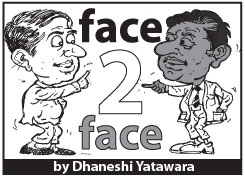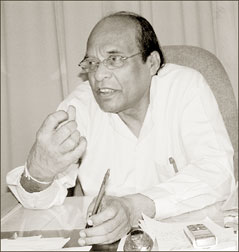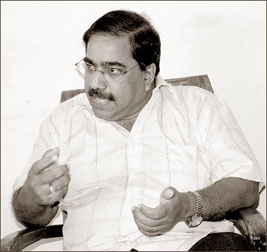|
Political solution - YES, but,
Who will be the takers?

For whom is the political solution? Is it for the LTTE, a separatist
armed group who believe in killings and torture, or to the innocent
Tamils living among us. Views given below are to point out the two sides
of this difficult and complicated path towards a lasting solution.
In which form should the political solution be presented to the
national question. How the innocent Tamil civilians and the LTTE should
be looked into with regard to a settlement?
|

Minister of Constitutional Affairs and National Intergration
D.E.W. Gunasekera
|
Minister of Constitutional Affairs and National Integration D.E.W.
Gunasekera: We have a history of missed and lost opportunities.
After Mr. Bandaranaiake's and Mr. Dudley Senanayake's futile attempts,
the next attempt was by Mr. J.R. Jayawardene trying to bring in the 13th
amendment. At that time it was a step forward. President Jayawardene
even with the 5/6th majority failed to implement it. It was implemented
in other provinces but not in the North and East. But years later when
President Premadasa, the successor was not in favour. Finally it was
"thrown into the winds" and the whole country went for a war and, it
still continues. Of course right throughout the LTTE was a stumbling
block. Dr. Neelan Thiruchelvam, who was the brain behind the federal
constitution, was killed by the LTTE. He was the person, hitherto, took
the most radical decision about a constitution. President Mahinda
Rajapaksa had to find a solution which five of his predecessors failed.
Absence of a conscience between the two major parties was the main
obstacle. During the 'Samagi Peramuna' regime, Mrs. Sirimavo
Bandaranaike while having talks with the Indian leaders on the
Citizenship issue at every turn of the discussion telephoned from New
Delhi to consult Mr. Dudley Senanayake, the then opposition leader for
his opinion. The problem was solved and if it was not, the present
situation would have got worse. Those prove the point that a conscience,
at least, among the two major parties is essential. The solution,
President Rajapaksa gave, at least makes an attempt to implement what is
legally elected. At the present state of political development this
seems inadequate. But until the APRC's in a position to arrive at a
solution President brought in the issue. The Eastern Province can not
remain unattended. The benefits of the 13th Amendment have not reach the
North and the Eastern Provinces.
|

Tamil National Alliance MP
Suresh Premachandran |
Tamil National Alliance MP Suresh Premachandran: A separate
State is actually not the wish of the Tamil people but actions taken by
the successive Governments in the past pushed the Tamil people towards
this decision. If the present Government can forward a perfect
alternative fulfilling the aspirations of the Tamil populace, the
national problem can be solved. TNA is still supporting a federal state.
If the government is ready to dissolve power in a rightful manner this
can be solved. If the Government continues to stress on a solution
within a unitary Constitution it will not incorporate Tamil aspirations.
The actual solution should be for the Tamil people. If the problem is
addressed in a proper manner I believe the LTTE will also fall in line.
If the then Government had solved the problem when late Mr.
Chelvanayakam and his party raised the issue of a federal state, there
wouldn't be a LTTE now. Now it is the LTTE, previously it was PLOTE,
EPRLF or EPDP. LTTE is not created by the Tamil people but by the
successive governments. So the problem Tamil people are facing now and
the LTTE cannot be separated. If the aspirations of the Tamil populace
are met then there is no need of weapons. Tamil leaders were extending
their fullest support to bring solutions to the grievances of the Tamil
people since independence. Therefore, after the failure of several
efforts by Tamil leaders, late Mr. Chelvanayakam declared in 1976 that
there can be no alternative but to consider a separate homeland. He was
following a non-violent path. But the then youngsters thought this
non-violent path will be unsuccessful as there were several prior
instances where the Tamil non-violent movements were thwarted by the
Government Military.
Despite the tougher approach taken against the LTTE, the outfit is
also constantly invited to enter into negotiations. So how is the LTTE
identified in the ethnic question?
D.E.W. Gunasekera: I do not think that the LTTE have changed
their position still. May be, in the future, Sometimes if a new leader
emerges the situation might change. But, Prabhakaran has proved by life
and history to be tough man insisting on an Eelam project. It is said
that he has told his close colleagues that the day he gives up Eelam he
is ready to sacrifice his life. He is a belligerent rascal. He thinks
that violence is the only method to win. Peace talks and negotiations
are compliances for them to strengthen. They exploit the opportunity
again to take a step forward. LTTE is not ready to give up Eelam and not
even to opt into an alternative solution. This time, they have no reason
to oppose. And now they turn around and say nothing less than a federal
system. I do not believe that LTTE is a liberation movement. There is a
difference between terrorists and a liberation movement. The whole
African continent was liberated through a struggle, at times arms
struggle, but they did not kill innocent people. A liberation movement
gains a lot of public support. Not the LTTE. The fact remains that the
two main parties account for 85% of the 'vote bank' of the country. The
moment the Sri Lanka Freedom Party and the United National Party agree
to a consensus, as I believe, it will totally change the political
landscape. It will bring pressure on the process and gain confidence of
the moderate Tamil speaking people. It can even put pressure on other
political parties to come to an agreement. Many Tamil speaking people
want to live peacefully in the country and are not much bothered about
political interests.
Suresh Premachandran: Many Sinhala politicians in the
government think that LTTE will not come for a dialogue and that they
are not ready to solve the problem in a unitary Sri Lanka. That is not
correct. LTTE is a party who gave a written proposal to the Sri Lankan
Government - the Interim Self Governing Authority (ISGA) for the
Northeast. ISGA demands were very high; I'm not denying it. But the LTTE
was prepared to discuss. Yet the Government was not ready to discuss it.
Then the P-TOMS proposals came up, when the JVP went to Courts and it
became useless. The LTTE couldn't do anything. LTTE has given signals to
solve this problem within a united country. In the name of eradicating
terrorism civilians are getting killed daily. These are innocent Tamil
people. So the war is not going to solve their problem. That is not the
answer to the Tamil national question. I will not believe on the
Government's preparedness for discussions. They have to create an
atmosphere where they can start talks. It is a question of believing in
what the Government says. If you are honest for a discussion then you
have to create some sort of a suitable atmosphere. Then the
international community and the local Tamil people can push the LTTE to
come in for talks. If one thinks that the military strategies can bring
about a final solution then democracy cannot be expected from either the
LTTE or the Sri Lankan Government.
How best the North and East crisis could be solved within a
unitary State?
D.E.W. Gunasekera: Well these words 'unitary' and 'federal'
are terminologies that do not necessarily be given concentration. These
are only methods through which the problems are solved. United Kingdom
have four parliaments. Yet they call themselves a unitary country. But
federal features are there. India, is called a federal state. But the
President has all the powers to make it a unitary. So essentially it is
not federal. If federalism is applied one can not take back the power. A
political system for a country have evolved with the basis of its
historical backgrounds. And you can not simply implant one model to a
country that is fitted to another. In my opinion the federal system
there is nothing to oppose. But things have changed so fast. What is
important is how much power should be given and for whom to be given. If
you decide on that, let it be called anything. Remember 61% of the Tamil
people are living in areas outside the North and East and 29% of the
total population speak Tamil.
Suresh Premachandran: After the Indo-Lanka Accord, efforts
were being made to solve the problem in a unitary country. Within a
unitary state, devolution of power is not possible; Decentralization is
possible. In decentralization powers given can be withdrawn at any time.
Tamil people would prefer to have their own administration in their own
areas as they can perform better that way. In many countries all over
the world people are living peacefully in multi religious, multi
lingual, multi cultural societies. Therefore, I see no chance for a
solution within a unitary solution. We must go beyond the current
vision. Radical changes must take place in the constitution. If you
think that by giving powers to the Tamil people they will move away or
part. That is utter rubbish. If you give enough power there is no need
for separation. Just because the Tamil people want to live in their own
culture and administration - it does not mean that there is no space for
other communities. The administration can be arranged in such a format
that everyone will be treated equally in every aspect. We are not for a
monolingual state.
What are the genuine grievances the Government thinks the Tamils
face in the North and East?
D.E.W. Gunasekera: The highest priority should be given to the
language. That is why I think President Rajapaksa assigned me the
ministerial subject of official languages which was under the Ministry
of Public Administration previously. He thought that this is part of the
national question. My first Cabinet paper to the first Cabinet of the
present Government was on official languages and the 13th amendment. I
emphasized that in the 13th Amendment the Tamil language becomes one of
the official languages but it was never implemented. That is why we lost
the confidence of the minorities. If this issue is not addressed the
frontiers of war will be extended. Now we are in the process of
implementing it. National integration can be achieved through language,
culture, religion. This can create a whole new atmosphere in the
society. For example there are many Tamil people residing near the
Malwathu- Asgiri temple in Kandy. With the initiation of teaching Tamil
the whole environment of the neighbourhood has changed. The gap between
the communities should be bridged before it gets wider.
Suresh Premachandran: There is a war going on for the last 30
years. It is not simple and not for fun. They are fighting for a cause.
In the Tamil dominated areas, specially in the North and East, the
economic development, education aspects were deprived. Sinhalese were
colonized in areas where majority were Tamil people. I am not denying
the fact that Tamil people moving into Sinhala dominant areas or Sinhala
people moving into Tamil dominant areas. There should not be any
restriction. But I am pointing at instances where the Government
purposely brought in Sinhala people from villages down south and made
them settle down in Tamil dominant areas, making the Tamils a minority.
Tamil people lost their parliamentary seats in these areas and became
minorities in their original lands. We have to score more marks to enter
universities. Learning Sinhala language was made compulsory for us to
get educated. So, that is why we tell the Government that if they are
not ready to incorporate us, then let us carry on separately. If yes,
give us the necessary powers to function. But enough is enough. We
should go forward for a solution.
Does not every citizen encounter grievances in their day to day
lives, be it Sinhala, Tamil, Muslim, Burgher, Moor or Malay? Or are
those unique to the Tamil populace?
D.E.W. Gunasekera: There are common grievances, whether Tamil
or Sinhala or of any other ethnicity were problems common to all. But
there are certain problems that arise because they being the minority.
25% of the population is Tamil speaking but see how it is being
reflected in the public service. This percentage is reducing daily. In
addition 4% retire annually from the Public service. That is why we are
trying to solve the language problem, particular in this transition
period.
Suresh Premachandran: Unique to the minorities. We agree even
Sinhala people do face problems. But it is all due to corruption in the
administration. Tamils are the majority among the minority. If the
Government functions properly then there would be no such grievances.
And why do we have to go as Sri Lankan Tamils, Sri Lankan Muslims. Why
can not we call ourselves Sri Lankans?
To what extent do you agree with the current proposal for a
political solution?
D.E.W. Gunasekera: It is only the 13th Amendment at present.
President Rajapaksa appointed the All Party Representative Committee to
find a solution and go beyond the 13th Amendment. The Government is
emphasizing on immediate and interim solution until the APRC reaches to
a final political solution. We must also note that LTTE have not only
losing their territory but they are losing confidence of their own
people.
Suresh Premachandran: After 20 years the Government is trying
to implement the 13th Amendment now, which does not meet the present
needs of the Tamil populace. Several years have rolled by since then.
Even a political student can say this is not enough. So I do not think
that you can do anything. This is a political problem. I think the 13th
Amendment is not the best route to solve the national issue.
|
